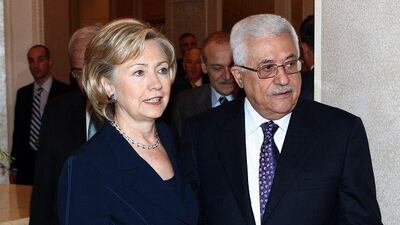ABU DHABI // The Palestinian president, Mahmoud Abbas, reiterated calls for an immediate halt to Israeli settlement expansion in the West Bank and East Jerusalem during a meeting with the US Secretary of State Hillary Clinton here yesterday.
A resumption of peace talks was contingent on a freeze in settlement activity, he said during the meeting. "The problem is that the Israeli government refuses to stop building settlements," in the West Bank and East Jerusalem, Mr Abbas said after the discussions, according to WAM, the state news agency. "The question of Jerusalem was at the centre of talks during our meeting today ... [Jerusalem] is in real danger. Without Jerusalem, there will be no point in peace."
The visit of the US administration's top diplomat follows months of efforts to revive the peace process led by George Mitchell, the US special envoy to the Middle East, who was also present during yesterday's talks. However, no breakthroughs were made during the high-level meeting, which was held at the Emirates Palace hotel. Mr Abbas and senior Palestinian officials met Mrs Clinton for more than an hour and a half, according to Nabil Abu Rudeina, a spokesman for the Palestinian Authority and an adviser to the president.
"The meeting was serious, very deep, but there were no results and no breakthroughs," he said. He added that the Israeli settlements were proving to be one of the most intractable obstacles to further progress. "There is nothing new. Things are facing deadlock and I think unless the American and the world community move in order to pressure Israel, things are not heading towards the right direction," Mr Abu Rudeina said.
"The Israelis are not ready for peace and the Americans are not able to pressure Israel to accept what is needed for real peace. "In the meeting with Hillary Clinton, we discussed all things. Every single detail, but there isn't anything new. The Israelis are still not willing to freeze the settlements." Until the US is willing to put enough pressure on Israel to halt settlement building, little progress will be made, he said, adding that "real action" was needed on the ground.
Saeb Erakat, the chief Palestinian negotiator, described the gap between the Palestinians and the Israeli administration as "very deep and widening even more", WAM reported. The issue of Israel's continued settlement expansion has drawn criticism in recent months, including from the US. Of particular concern are new settlements being created in the heart of East Jerusalem. The US administration's efforts to get Israel to agree to a freeze on Israeli settlements, built on occupied land in the West Bank and East Jerusalem and illegal under international law, have so far proven unsuccessful.
After her meeting with Mr Abbas, Mrs Clinton travelled to Israel for talks with the Israeli prime minister, Benjamin Netanyahu. On her plane, a State Department spokesman, PJ Crowley, said he could not discuss specifics of the talks with Mr Abbas. "I don't think it's fruitful to go through that at this time," Mr Crowley said, adding that the US goal at this stage, with regard to Israeli settlements, was to "narrow the gap to a sufficient degree" that both sides can agree to resume negotiations.
Approximately 500,000 Israelis live in settlements in the West Bank and East Jerusalem, alongside three million Palestinians. The Palestinians view the settlements as the main stumbling block to the creation of an independent state. The US president, Barack Obama, has made restarting the peace process a key aim of his foreign policy. In September, he hosted a meeting in New York attended by Mr Abbas and Mr Netanyahu, but it yielded no progress.
The most recent round of negotiations to end the protracted conflict broke off in December following the start of Israel's offensive on Gaza, which left more than 1,300 Palestinians dead. The Goldstone report, a UN-investigation into the offensive, alleges that war crimes were committed by both Israel and Hamas and that a lack of accountability was harming hopes of reviving the peace process. Mr Abbas arrived in the capital on Friday and was greeted at the airport by Sheikh Abdullah bin Zayed, the Foreign Minister, WAM reported.
Mrs Clinton also arrived late on Friday after a trip to Pakistan. This is Mrs Clinton's second visit to the Middle East in her role as secretary of state. The meetings come ahead of a summit being held this week in Morocco, where Mrs Clinton will join officials from around the region in efforts to revive the peace process. * The National, with additional reporting by the Associated Press

